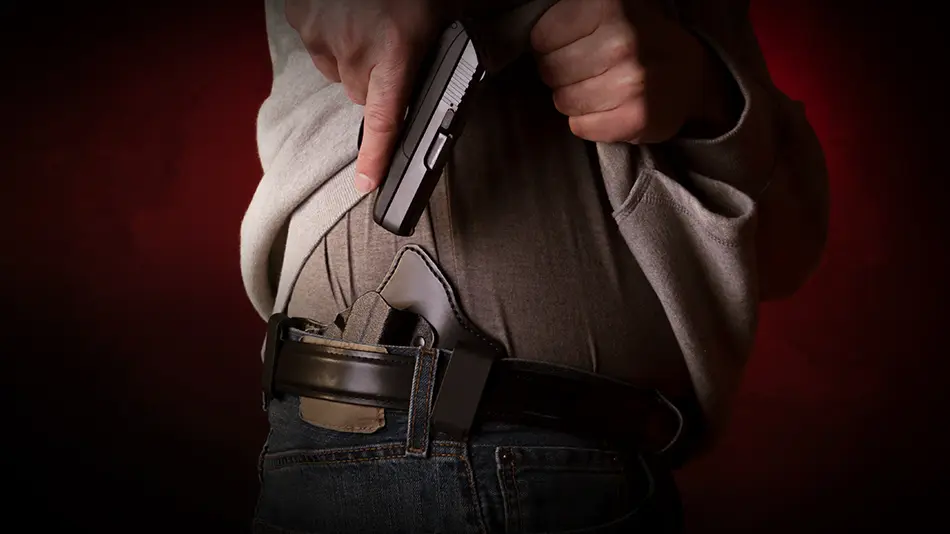
Home defense is an important topic for self-defenders, not only because it tends to be the primary reason many people own firearms but also due to its nuances. When trying to make a home defense plan for your place of residence, you might be wondering what firearm to use, how to store or stage it, and what laws might pertain to you when protecting yourself from a home invasion. Before planning practical home defense strategies, it’s a good idea to have a general understanding of what it means to defend your place of residence.
What Is Home Defense?
Home defense refers to protecting your occupied residence from a threat, meaning you, your family members, and/or your loved ones must be inside the residence at the time. For example, if you’re out at the grocery store and you’re attacked, that would be a self-defense scenario, not a home-defense situation. Generally, you’re already inside your residence when someone forces their way into your home, presents a threat, and leaves you with no choice but to defend yourself.
How Likely Is a Home Invasion?
It’s impossible to predict whether you could become the target of a home invasion, but the FBI does provide some statistics regarding their frequency. Before getting into those numbers, it’s necessary to understand the difference between a burglary and a robbery, because they’re different and are reported separately by law enforcement when gathering statistics.
While the specific definitions of “burglary” and “robbery” may differ from state to state, the Federal Bureau of Investigation (FBI) provides an overview. According to the FBI’s Uniform Crime Reporting (UCR) Program, a robbery is defined as “the taking or attempting to take anything of value from the care, custody, or control of a person or persons by force or threat of force.” They define a burglary as “the unlawful entry of a structure to commit a felony or theft.”
In short, robbery tends to focus on the fact that a human victim is involved in a theft, while burglary generally pertains to when a person unlawfully enters or remains in a building for the purpose of committing a theft or other felony. Pertaining to a home invasion, you’re probably going to see more stories about “burglaries” than “robberies.” Generally, a person who is woken up to an intruder in the house is probably a victim of burglary (or another serious crime), while a person who’s approached in his driveway and told to “hand over the money or else” is probably a victim of a robbery.
Can I Legally Defend Myself at Home?
Defending yourself in your occupied home in the state where you live can be very tricky. Unfortunately, there’s not a one-size-fits-all recommendation, which is why we encourage you to reach out to an Independent Program Attorney and ask them what the laws are in your state! For instance, some states might require you to retreat in certain situations, some might require you to use certain levels of force, and some might have a presumption of reasonableness for people who defend themselves in certain occupied areas, such as those that have codified the Castle Doctrine in their laws.
What Is the Castle Doctrine?
Castle Doctrine is the legal theory that may allow residents or occupants of a home to use force or deadly force to defend against home invaders. The law will always depend on the state in which you live, which is why it’s vital to know and understand the self-defense laws in your area. Castle Doctrine laws can broaden existing self-defense rights and justification under the law. This means it may give the person who defended themselves an expansion of legal justification in court, offering protection they might not have in a state without a strong Castle Doctrine law.
As noted above, many Castle Doctrine laws also contain a legal presumption. This is used to direct the jury to presume, under certain circumstances, that the person was reasonable in their use of force or deadly force. A legal presumption can help prevent the second-guessing of actions after the fact that many people and jurors are prone to participating in during a self-defense case.
If a person is attacked and must use force or deadly force to defend their life or lives of loved ones, the person may be justified if the self-defense situation fits certain parameters. These parameters generally include meeting the “reasonable person standard” and reasonableness under the “totality of the circumstances.” At their simplest, these terms mean the person acting in self-defense must be defending against an immediate, qualifying threat with a reasonable degree of force. To be covered under Castle Doctrine, the act of self-defense must occur in one of the locations listed in the law of the state where the action occurred (the “castle”) and must happen under certain circumstances and conditions.
To learn more about Castle Doctrine, click here.
How Do I Protect My Family from Home Invasion?
It’s extremely important to know the law and be aware of what your state allows you to do when considering home defense plans. The first step in protecting your family from home invasion is to know your local laws about self-defense and home defense. U.S. LawShield® is here to help you understand those laws. If you’re a U.S. LawShield member and have legal questions about home defense, ask an Independent Program Attorney! If you’re not yet a member, take a look at our membership page to join and receive all the benefits of Legal Defense for Self Defense® coverage.
Your Protection Starts Here!
There’s nothing more important than protecting yourself and your family. By joining our community of members, you can count on our self-defense coverage, with meaningful options and benefits that make a real difference.
The information provided in this publication is intended to provide general information to individuals and is not legal advice. The information included in this publication may not be quoted or referred to in any other publication without the prior written consent of U.S. LawShield, to be given or withheld at our discretion. The information is not a substitute for, and does not replace the advice or representation of a licensed attorney. We strive to ensure the information included in this publication is accurate and current, however, no claim is made to the accuracy of the information and we are not responsible for any consequences that may result from the use of information in this publication. The use of this publication does not create an attorney-client relationship between U.S. LawShield, any independent program attorney, and any individual.





Very informative and useful article . Have been a member for several years and by the grace of God have not had to use the plan, but now I would like to add the bail and professional witness plan to my coverage please tell me how to accomplish this. Thanks
Hugh, we appreciate you being a loyal member and we’re glad you enjoyed the article. Please call member services during business hours to add bail bonds and expert witness to your plan. The number is 877-448-6839
1% of gun owners, or approximately 25.3 million adult Americans, have used a gun in self-defense.
Hope you are better at self-defense than you are at math. This would mean that there are 2,530 million or 2.53 billion gun owners! In fact, it is estimated that 40% of Americans over 18 own a gun, or 78% times 40% times 331 million or 103 million gun owners. So, if 1% used a gun in self-defense is would be around 1 million. However, this number is highly suspect, since the vast majority of incidents in which a gun prevents an attack are by merely presenting or declaring.
There is probably a typo. Should or be of? That would fix the math problem. Presenting and declaring are still considered “use”.
I simply cannot imagine an America where I have to fear the law being applied AGAINST me if I shoot someone in my home. If someone opens my gate, walks all the way down my drive, and enters my home without an invitation, I assume they have a death wish. I have children. I am not going to wait to see if the intruder is violent or on drugs or “lost”. That brief hesitation could cost lives I love.
I have been a US Law Shield member for several years. Are there and seminars that I can attend in Utah where I currently live?
Gary, thanks for being a loyal member! Please check our events page for events in your areahttps://www.uslawshield.com/seminar/
Good post
Thanks for reading!
Great article, and appreciate the embedded link to the study.
Rev. Mueller is right, though, you should correct that sentence : “1% of gun owners, or approximately 25.3 million adult Americans, have used a gun in self-defense.”. It is clearly incorrect, and to be honest, I can’t even see how that figure came about from the study. Won’t be helpful for folks to copy-paste cite your article, and end up promulgating incorrect info. The mathematically correct info, based on however you want to slice the study’s data, is powerful enough!
Thanks for reading!